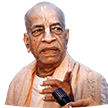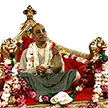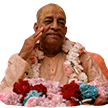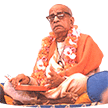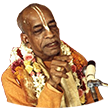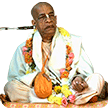Qualification - an essential subject: Difference between revisions
(Created page with "Category:Essential Subjects <!----------------------- edit below this line -----------------------> <!------------------------ begin introduction text below --------------...") |
(Vanibot #0041: Moves Choose Another box to the end) |
||
| Line 2: | Line 2: | ||
<!----------------------- edit below this line -----------------------> | <!----------------------- edit below this line -----------------------> | ||
<!------------------------ begin introduction text below ------------------------> | <!------------------------ begin introduction text below ------------------------> | ||
The real qualification is to become a devotee of the Lord, and gradually all the good qualities worthy of possession develop. Mahārāja Parīkṣit was a mahā-bhāgavata, or a first-class devotee, who was not only well versed in the science of devotion but also able to convert others to become devotees by his transcendental instructions. Mahārāja Parīkṣit was, therefore, a devotee of the first order, and thus he used to consult great sages and learned brāhmaṇas, who could advise him by the śāstras how to execute the state administration. Such great kings were more responsible than modern elected executive heads because they obliged the great authorities by following their instructions left in Vedic literatures. | |||
Srila Prabhupada's books, lectures, conversations and letters offer a comprehensive presentation of this essential subject as seen in the Vaniquotes '''[[Vaniquotes:Category:Qualification|Qualification]]''' category. An introduction from his books is given below in the following | Srila Prabhupada's books, lectures, conversations and letters offer a comprehensive presentation of this essential subject as seen in the Vaniquotes '''[[Vaniquotes:Category:Qualification|Qualification]]''' category. An introduction from his books is given below in the following 8 quotes. | ||
<!-------- end introduction text and don't touch next three lines ---------> | <!-------- end introduction text and don't touch next three lines ---------> | ||
---- | ---- | ||
== Quotes from Srila Prabhupada's books == | == Quotes from Srila Prabhupada's books == | ||
<!----------------- edit quote boxes below this line -----------------> | <!----------------- edit quote boxes below this line -----------------> | ||
{{VaniQuotebox| | {{VaniQuotebox|A devotee is always qualified with all the good qualities of God. Quantitatively such qualifications may be different, but qualitatively both the Lord and His devotee are one and the same|A devotee is neither foolish nor passionate. The harmful, foolish and passionate cannot be devotees of the Lord, however they may advertise themselves as devotees by outward dress. A devotee is always qualified with all the good qualities of God. Quantitatively such qualifications may be different, but qualitatively both the Lord and His devotee are one and the same. '''(Śrīmad-Bhāgavatam 1.2.19)'''}} | ||
{{VaniQuotebox| | {{VaniQuotebox|A living being desires something, and the Lord supplies the object of that desire in proportion to one's qualification|A living being desires something, and the Lord supplies the object of that desire in proportion to one's qualification. If a man wants to be a high-court judge, he must acquire not only the necessary qualifications but also the consent of the authority who can award the title of high-court judge. The qualifications in themselves are insufficient for one to occupy the post: it must be awarded by some superior authority. Similarly, the Lord awards enjoyment to living entities in proportion to their qualifications, but good qualifications in themselves are not sufficient to enable one to receive awards. '''(Sri Isopaniṣad, Mantra 8)'''}} | ||
{{VaniQuotebox| | {{VaniQuotebox|A pure devotee of the Lord is also not affected by the modes of nature. That is the primary qualification for being one with the Lord. A person who is able to attain this transcendental qualification is called jivan-mukta|This stage of transcendental qualification is called śuddha-sattva, or vasudeva, and in this stage the science of God can be realized. As the Lord is not affected by the modes of material nature, so a pure devotee of the Lord is also not affected by the modes of nature. That is the primary qualification for being one with the Lord. A person who is able to attain this transcendental qualification is called jīvan-mukta. '''(Śrīmad-Bhāgavatam 3.4.31)'''}} | ||
{{VaniQuotebox| | {{VaniQuotebox|According to Bhagavad-gita, a sadhu is a man in Krsna consciousness. A person may appear to be irreligious, but if he has the qualifications of Krsna consciousness wholly and fully, he is to be understood to be a sadhu|According to Bhagavad-gītā, a sādhu (holy man) is a man in Kṛṣṇa consciousness. A person may appear to be irreligious, but if he has the qualifications of Kṛṣṇa consciousness wholly and fully, he is to be understood to be a sādhu. And duṣkṛtām applies to those who do not care for Kṛṣṇa consciousness. Such miscreants, or duṣkṛtām, are described as foolish and the lowest of mankind, even though they may be decorated with mundane education, whereas a person who is one hundred percent engaged in Kṛṣṇa consciousness is accepted as a sādhu, even though such a person may be neither learned nor well cultured. '''(Bhagavad-gītā 4.8)'''}} | ||
{{VaniQuotebox| | {{VaniQuotebox|All pure devotees of the Lord come to this material world with full compassion to deliver the sinful. They undergo all kinds of tribulations, suffering them with tolerance, because that is another qualification of a Vaisnava|Kṛṣṇa is therefore known as para-duḥkha-duḥkhī kṛpāmbudhiḥ, or one who is compassionate toward others' suffering and who is an ocean of mercy. Like Prahlāda Mahārāja, all pure devotees of the Lord come to this material world with full compassion to deliver the sinful. They undergo all kinds of tribulations, suffering them with tolerance, because that is another qualification of a Vaiṣṇava, who tries to deliver all sinful persons from the hellish conditions of material existence. '''(Śrīmad-Bhāgavatam 4.21.47)'''}} | ||
{{VaniQuotebox| | {{VaniQuotebox|All sastric injunctions, as well as the versions of great sages and authorities, establish that a bona fide spiritual master is not necessarily a brahmana by caste. The only qualification is that he be conversant with the science of Krsna|Similarly, if a person is born in a śūdra family but has the qualifications of a brāhmaṇa, he should be accepted as a brāhmaṇa. All śāstric injunctions, as well as the versions of great sages and authorities, establish that a bona fide spiritual master is not necessarily a brāhmaṇa by caste. The only qualification is that he be conversant with the science of Kṛṣṇa, Kṛṣṇa consciousness. That alone makes one perfectly eligible to become a spiritual master. '''(Teachings of Lord Caitanya, Chapter 31)'''}} | ||
{{VaniQuotebox| | {{VaniQuotebox|Although he (Romaharsana) has the good qualification of being a disciple of Lord Vyasadeva, and although he has studied all the Vedic literature from this exalted personality, he was not submissive in the presence of the Supreme Personality of Godhead|This man is liable to be awarded the death punishment because although he has the good qualification of being a disciple of Lord Vyāsadeva, and although he has studied all the Vedic literature from this exalted personality, he was not submissive in the presence of the Supreme Personality of Godhead." As stated in the Bhagavad-gītā, a person who is actually a brāhmaṇa and is very learned must automatically become very gentle also. '''(Kṛṣṇa Book, Chapter 78)'''}} | ||
{{VaniQuotebox| | {{VaniQuotebox|Although there is a tinge of goodness in this material world in terms of the brahminical qualifications, such qualifications sometimes become invisible because of the strong prevalence of the modes of passion and ignorance|Although there is a tinge of goodness in this material world in terms of the brahminical qualifications, such qualifications sometimes become invisible because of the strong prevalence of the modes of passion and ignorance. But because the Lord is always transcendentally situated, the material modes of passion and ignorance cannot touch Him. Whenever the Lord is present, there cannot be any darkness from the mode of ignorance. '''(Śrīmad-Bhāgavatam 7.8.24)'''}} | ||
<!----------------- edit quote boxes above this line -----------------> | <!----------------- edit quote boxes above this line -----------------> | ||
| Line 31: | Line 31: | ||
'''Qualification - [[Vaniquotes:Category:Qualification|explore more within this category]]'''. | '''Qualification - [[Vaniquotes:Category:Qualification|explore more within this category]]'''. | ||
{{EsentialSubjectTotal}} | {{EsentialSubjectTotal}} | ||
<div style="float:left;"> | |||
{{EssentialSubjectnav}} | |||
</div> | |||
__NOTOC__ | __NOTOC__ | ||
__NOEDITSECTION__ | __NOEDITSECTION__ | ||
Latest revision as of 17:17, 22 November 2020
The real qualification is to become a devotee of the Lord, and gradually all the good qualities worthy of possession develop. Mahārāja Parīkṣit was a mahā-bhāgavata, or a first-class devotee, who was not only well versed in the science of devotion but also able to convert others to become devotees by his transcendental instructions. Mahārāja Parīkṣit was, therefore, a devotee of the first order, and thus he used to consult great sages and learned brāhmaṇas, who could advise him by the śāstras how to execute the state administration. Such great kings were more responsible than modern elected executive heads because they obliged the great authorities by following their instructions left in Vedic literatures.
Srila Prabhupada's books, lectures, conversations and letters offer a comprehensive presentation of this essential subject as seen in the Vaniquotes Qualification category. An introduction from his books is given below in the following 8 quotes.
Quotes from Srila Prabhupada's books
Qualification - explore more within this category.
Vanipedia has now over 903 introductory articles compiled from Srila Prabhupada's books under the series titled Essential Subjects. All these articles can be seen in the Table of Content on the right side of this article and also here in this Umbrella Category. Browse through them to relish the breadth and depth of Srila Prabhupada's teachings - There is a subject for everyone.
